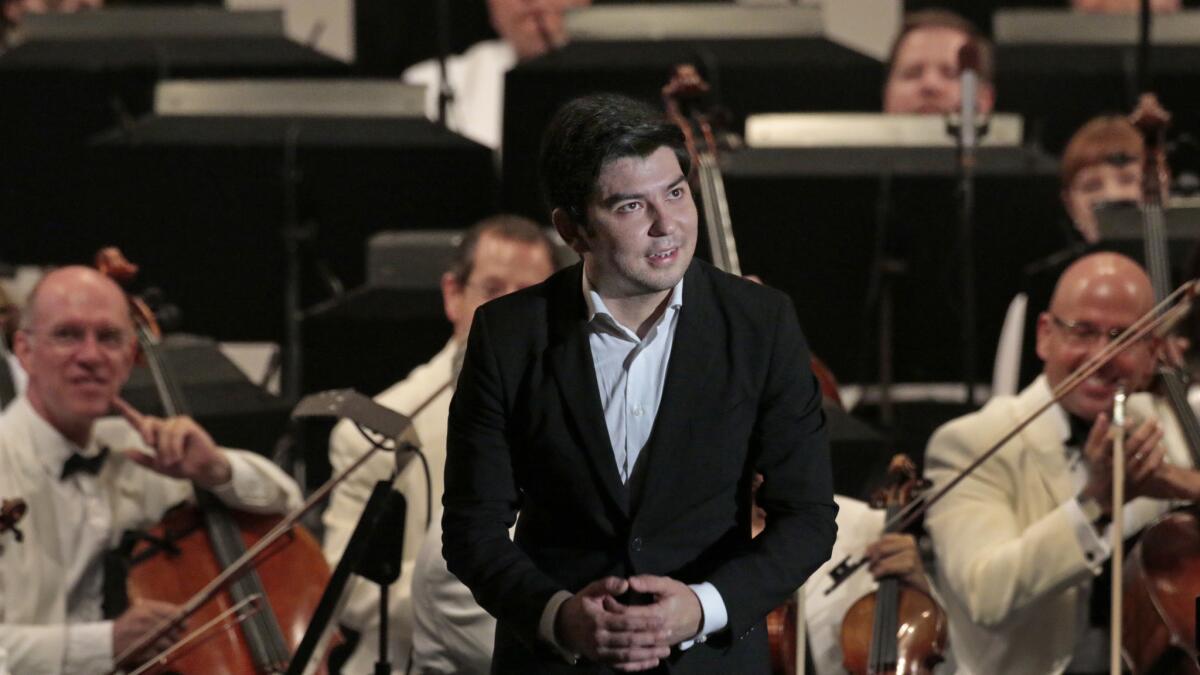Review: Gustavo Dudamel and pianist Behzod Abduraimov amp the passion, hold the schmaltz in Rachmaninoff at the Bowl

Uzbekistani pianist Behzod Abduraimov is fast becoming one of the finest musicians of his generation. Over the last few years, the 27-year-old from Tashkent established a reputation in Los Angeles for stepping in on short notice and delivering.
In 2014, Abduraimov subbed at the Hollywood Bowl for Yefim Bronfman (incidentally, also born in Tashkent), performing Tchaikovsky’s First Piano Concerto. Later that year, he replaced violinist Leila Josefowicz at Walt Disney Concert Hall, switching the program to Prokofiev’s Piano Concerto No. 3.
Although Abduraimov got his own Bowl gig last August, tackling Rachmaninoff’s fearsome Piano Concerto No. 3, on Thursday night at the Bowl he was subbing once again, this time for ailing pianist Khatia Buniatishvili, playing Rachmaninoff’s Piano Concerto No. 2.
SIGN UP for the free Essential Arts & Culture newsletter »
Like Buniatishvili, Abduraimov displays special fondness for Liszt and the Russian repertory. Lately, he’s also been branching out with traversals of Chopin’s Ballades.
On Thursday night, the chemistry between soloist and orchestra in the Rachmaninoff was unmistakable. Dudamel’s tempos seemed comfortable and natural, generating the right amount of harmonic tension and contoured to highlight Abduraimov’s considerable technique, lyrical gifts and finely judged musicality.
Most impressive was how Dudamel and Abduraimov held the line between passion and schmaltz, while avoiding bombast in this warhorse.
Perhaps understandably in an amplified outdoor venue, the soloist was slightly smothered by the orchestra during some of the score’s more intricate ensemble passages. And the central Adagio, beautifully rendered by Abduraimov, did have a timing problem, one that was not the pianist’s fault. Ambient noise may be a plague of outdoor venues, but what are the odds that a helicopter would fly over as Abduraimov began the Adagio, and a car alarm would sound in the Bowl parking lot just as the movement quietly ended?
Preparing for the triumphant ending of the Allegro finale, Abduraimov shot his cuffs at the keyboard, displaying take-charge authority. His encore, Liszt’s “La Campanella” étude, with its chiming chords, finger-busting repeated notes and dazzling upper register passages, felt like another shot of adrenaline. Someone needs to book him at Disney Hall for a recital.
In the concert’s second half, Dudamel and the Philharmonic performed Ravel’s orchestration of Mussorgsky’s “Pictures at an Exhibition.” Highlights of the work included Whitney Crockett’s bassoon and Patrick Posey’s saxophone, which conveyed the mystery and Slavic melancholy of “Il vecchio castello.” The lumbering “Bydlo” was impressively performed by David Rejano Cantero on euphonium.
The woodwinds sent the “Chicks in Their Shells” scampering delightfully; Thomas Hooten’s muted piccolo trumpet elicited sympathy in “Two Polish Jews”; and “Catacombae” gave the richly sonorous Philharmonic brass a bracing workout.
But though the penultimate “Baba Yaga” initially elicited whimsy, it lacked cumulative dynamic force. Similarly, the concluding “Great Gate of Kiev” felt under-powered, the sound recessed, as if Dudamel was holding back for fireworks that were not part of this particular show.
See all of our latest arts news and reviews at latimes.com/arts.
More to Read
The biggest entertainment stories
Get our big stories about Hollywood, film, television, music, arts, culture and more right in your inbox as soon as they publish.
You may occasionally receive promotional content from the Los Angeles Times.






